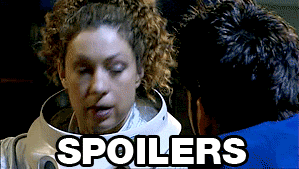So, kind of an exciting book this week because... IT ISN'T OUT YET. I know, how did we manage this?! Well, because I work at a bookstore, publishers send us copies of books that haven't been released yet so that we will, potentially, read them and then tell the customers about them.
So this week's read, Trial by Fire, came in this epic looking box. I mean, this think was tripped out in all of its marketing glory, and the summary looked marginally good, so I decided to grab it and then thought it would really be cool for Alex and I to read it for the blog before it came out.
I actually liked this book WAY more than I thought. The thing about the Advanced Reader Copies (ARCs) that we get at work is that about 85% of them are absolute crap. And Trial by Fire looked like it could really go either way (the packaging really made it seem like it was overcompensating for something.)
But the world building was amazing. Angelini really drew you in and created this great new place that was magical and wonderful. She created a character that you loved. Lily had the potential to be REALLY annoying, but she wasn't. Her relationship with Rowan had the potential to be really annoying... but it wasn't (though, a little stereotypical I will admit.) I like that for once it was free of love triangles. I love that there was a legitimate REASON that Lily came incredibly quickly into her powers. I like that there weren't big gaping plot holes.
And I liked that there was still a little bit of mystery left to the book.
Now, I'm not going to say everything was perfect. There were still a lot of the same old tropes (IE the everyone loves the main character trope), but even they weren't so bad as they could have been. Angelini seems to integrate them with her story very well so they don't stand out so much as to distract from the story.
This is definitely one to pick up when it comes out on September 3rd!
When Cassy told me we were going to read a book that wasn't even out yet, I was curious. I don't read a lot of ARCs, because I don't typically read books without knowing anything about them. ARCs usually don't even have a summary on the back, so all you have to go on is visual cues from the packaging and whatever the author has put up on their blog.
But like she said, this one was a really pleasant surprise. The world (both worlds, actually) is great. The characters act like real people, which is something that kept occurring to me throughout the story over and over.
One thing that worried me was the world switching. You start in present-ish-day here-and-now, and after less than 50 pages, you're in a totally new world with different characters, different rules, and when I realized this, I inwardly groaned. I gave it a chance: I thought maybe we'd be going back and forth between the worlds, and that's an excellent place to introduce the alternate one. But once it looked like we were stuck there for the duration, I rolled my eyes. I just figured out what was going on here in world number one! Now I have to start over? I've been reading for a few dozen pages; I don't want to feel like I've picked up another book. BUT! It actually picked up really quickly and didn't really feel that way. It worked perfectly.
I also cringed when I finished the book, put it down, and thought, "Oh. I guess that's going to be a trilogy." Then I put the book back in its pretty packaging and realized that the side of the packaging had said "Worldwalker Trilogy" the whole time, so I'm just not super observant sometimes. But even without that glaringly obvious indication that this will be a trilogy, the ending makes it very clear that you aren't done here and there will be more books. Which, once I reflected on it, will be kind of awesome. There are some aspects of both worlds that I would really like to hear more about. Bummer is, since we read it early, we have to wait even longer for the sequel.
HEY GUYS! If you life in the DC Metro Area, Cassy is going to be writing book trivia for 94.7 Fresh FM.
On Sept. 2, tune in at 7:30 AM for Can't Beat Kelly and you can hear some book trivia questions that she wrote!! So tune into The Tommy Show. You can also listen to it here!
But like she said, this one was a really pleasant surprise. The world (both worlds, actually) is great. The characters act like real people, which is something that kept occurring to me throughout the story over and over.
One thing that worried me was the world switching. You start in present-ish-day here-and-now, and after less than 50 pages, you're in a totally new world with different characters, different rules, and when I realized this, I inwardly groaned. I gave it a chance: I thought maybe we'd be going back and forth between the worlds, and that's an excellent place to introduce the alternate one. But once it looked like we were stuck there for the duration, I rolled my eyes. I just figured out what was going on here in world number one! Now I have to start over? I've been reading for a few dozen pages; I don't want to feel like I've picked up another book. BUT! It actually picked up really quickly and didn't really feel that way. It worked perfectly.
I also cringed when I finished the book, put it down, and thought, "Oh. I guess that's going to be a trilogy." Then I put the book back in its pretty packaging and realized that the side of the packaging had said "Worldwalker Trilogy" the whole time, so I'm just not super observant sometimes. But even without that glaringly obvious indication that this will be a trilogy, the ending makes it very clear that you aren't done here and there will be more books. Which, once I reflected on it, will be kind of awesome. There are some aspects of both worlds that I would really like to hear more about. Bummer is, since we read it early, we have to wait even longer for the sequel.
HEY GUYS! If you life in the DC Metro Area, Cassy is going to be writing book trivia for 94.7 Fresh FM.
On Sept. 2, tune in at 7:30 AM for Can't Beat Kelly and you can hear some book trivia questions that she wrote!! So tune into The Tommy Show. You can also listen to it here!


























